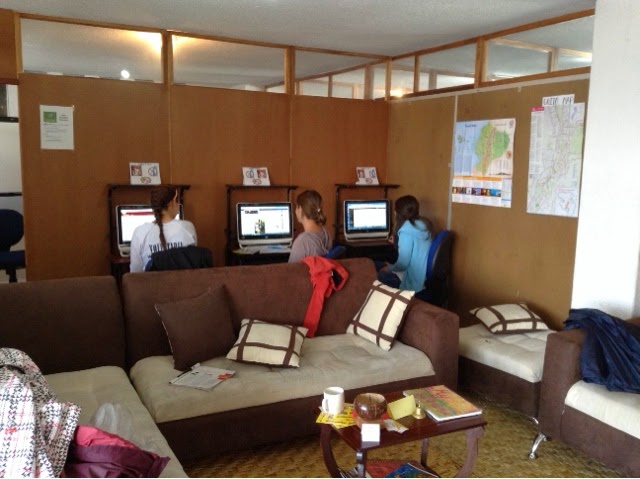Set up for the day, my house mates and I head off to the Volunteer Connection Ecuador (VCE) office for Spanish lessons in the morning. My teacher Laura usually works me hard! We go through lots of vocab and learn new verbs, with some games to test me and keep me on my toes! After some confusion on my part I think I've learnt a lot more to be able to talk to the staff in Spanish (well for basic things!)
VCE office - Volunteers can use the computers for Internet and those working with the admin team for the projects they are working on.
A break for lunch allows us time to grab either a complete meal for $2.5 from Mayra's restaurant Los Seccos under the flat, which includes soup, main course with rice, desert and juice, or a snack of tamales or humitas for around a dollar for two from a local stall around the corner from the VCE office.
Then for the part timers like me it's off to the UBECI - United to Benefit Ecuadorian Children International - office around the corner. I am living within 5 minutes walk of both offices in the barrio of Villa Flora in South Quito.
UBECI staff run a weekly meeting every Tuesday to explain to the volunteers the activities for the children for that week - different depending on the age group. Danny heads up the 1-3 year olds, Lule keeps the 4-6 years occupied and Christine helps out the 6+ children with homework as well, with some help from Oriana - a full time long term volunteer. Director Alicia holds down the fort in the office when the staff head to the markets every day and it's her that ensures us volunteers get on the right bus for the afternoon sessions!
We turn up at 1pm and get directed to the correct bus - then it's off to one of the markets (they go to different ones every day). On arrival the full timers that have been there in the mornings are usually playing with any children that have turned up early. If they moved to a new location for the afternoon then we set up a washing station - for the kids to wash their hands and faces before they start playing - this is important to help instil some hygiene awareness and so the kids hopefully go home a little cleaner than they came (not always possible if we do painting!)
Then the play mates are set up - it's important to have somewhere to put the toys out and let the kids sit down and play that's relatively clean. Working in the markets means the floor can be dirty. The various toys and books are put out and if there is space a pelota or ball is also kicked about. The kids have some free play time with the volunteers whilst the small ones are picked up from their parents by the staff.
When everyone is ready and has had a chance to work off some excitement with the toys and puzzles the staff get the children involved in some group activities. This can be playing physical games to help with their coordination, or singing songs with actions involved. Unfortunately I only know the words to some of the songs like Mi Cuerpo and the rest I try and join in with the actions and the few words I do know!
Then the children are split into their age groups and go to do their different activities. I've been helping Danny with the 1-3 year olds and the activities over the last 2 weeks have included playing doctor and reinforcing that the kids need to tell their parents when they are sick and that they need to see a doctor, to fine coordination skills ripping up paper or making and throwing balls out of magazine pages.
We also did some colouring in of niño and niña pictures - after talking about who is a boy or girl and what makes them different. When we are finished with the age focused activities the kids line up to receive stickers - those not lining up forfeit this right and they all want stickers! Then we sing the goodbye song - in Spanish and English - and the staff and volunteers take the smaller children back to their parents.
Then it's up to the volunteers to pack up and make our way back to the UBECI office with the toys and mats etc.
The objectives of the street & working children market program - even in a few weeks you can see the children benefitting from their time in the program. Eventually when they are old enough the parents commit to the children attending school, so far this has been really successful.
My host family then provides dinner - usually local Ecuadorian fare of rice and some meat with a salad or plantains and drinks. There is no smoking or alcoholic drinks allowed at the homestays out of respect to the families. This doesn't stop the volunteers venturing out into the Mariscal area of Quito (aka Gringolandia) for a drink and a dance every so often!
There is also plenty of opportunity for volunteers to see the sights in and around Quito (this will be a separate blog post coming soon!), here is a quick taster of some of the sights:















No comments:
Post a Comment